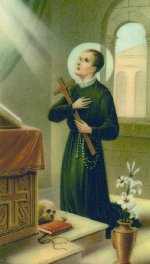
RadaGhedesPetro |

Gede
| Other Names: | Papa Gede, Baron Samedi, Bawon Samedi |
| Spheres of Influence: |
Death, the Lord of all Gede |
| Nation: | Ghede |
| Colours: | Black, purple and white |
| Symbols: | Skull, black cross, shovel, mirrored sunglasses, hot peppers fused with kleren |
| Offerings: | Black rooster, black goat |
| Catholic counterparts: |  St. Gerard |
| Images: | I'm very fond of this image by artist Josh Agle. |
| Quotations: |
"If Legba was the sun, at first young, then growing old, Ghede is the master of that abyss into which the sun descnends. If Legba was time, Ghede is that eternal figure in black, posted at the timeless cross-roads at which all men and even the sun one day arrive. The cross upon a tomb is his symbol. But the sun is each year rebord. If Carrefour is the night death which attends each day, then Ghede is the night sun, the life which is eternally present, even in darkness. The cosmic abyss is both tomb and womb. In a sense, Ghede is the Legba who has crossed the cosmic threshold to the underworld, for Ghede is now everything that Legba once was in the promise and the prime of his life. [...] Ghede is, today, the phallic deity also. If Legba was once Lord of Life, Ghede is now Lord of Resurrection; and the difference between them is Death, which is Ghede." [Deren 1953] "The Gede family of spirits are the guardians of the dead and masters of libido. They embrace the dual domains of human frailty and mortality, the creation and the conclusion of life. "This is not morbid, as it may be perceived in the West, but is in fact a celebration of the ancestral spirits and the continuation of tradition. Gede has strong powers of healing that are especially potent for children." [Gordon 2000] "Their boss is the Baron (Bawon Samdi, or 'Baron Saturday'), married to Grand Brigitte, mother of the Gedes. Family members dress themselves in black and purple costumes reminiscent of Masonic garb, and surround themselves with graveyard imagery. They also favor sunglasses because the world above ground is too bright. Gede is a shameless trickster, a wise counselor, and a benevolent healer known to have special love for children." [Cosentino] |
Copyright © 2001, 2002, 2004 by B.C. Holmes. Last updated March 23rd, 2002
Back to the Lwas page.